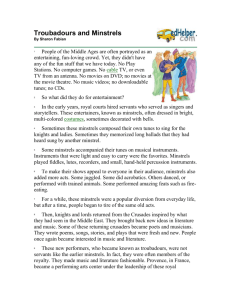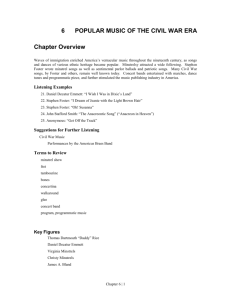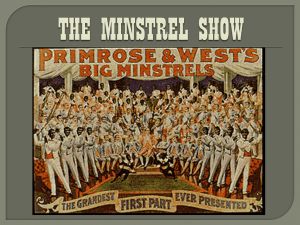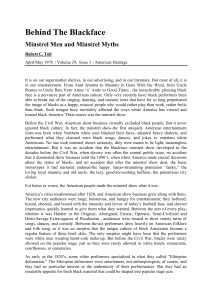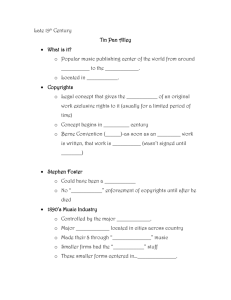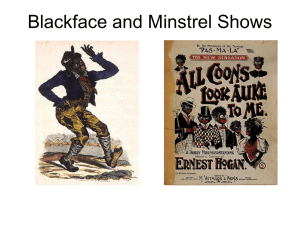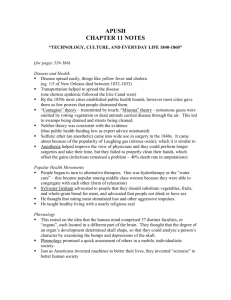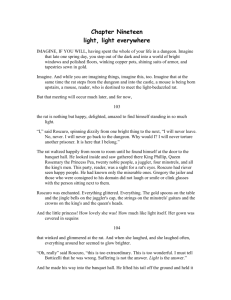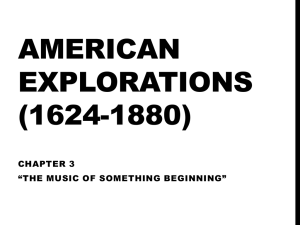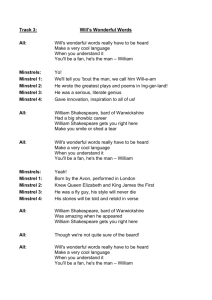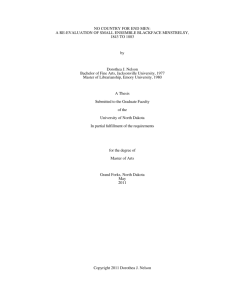Whitwell - Essays on the Origins of Western Music
advertisement
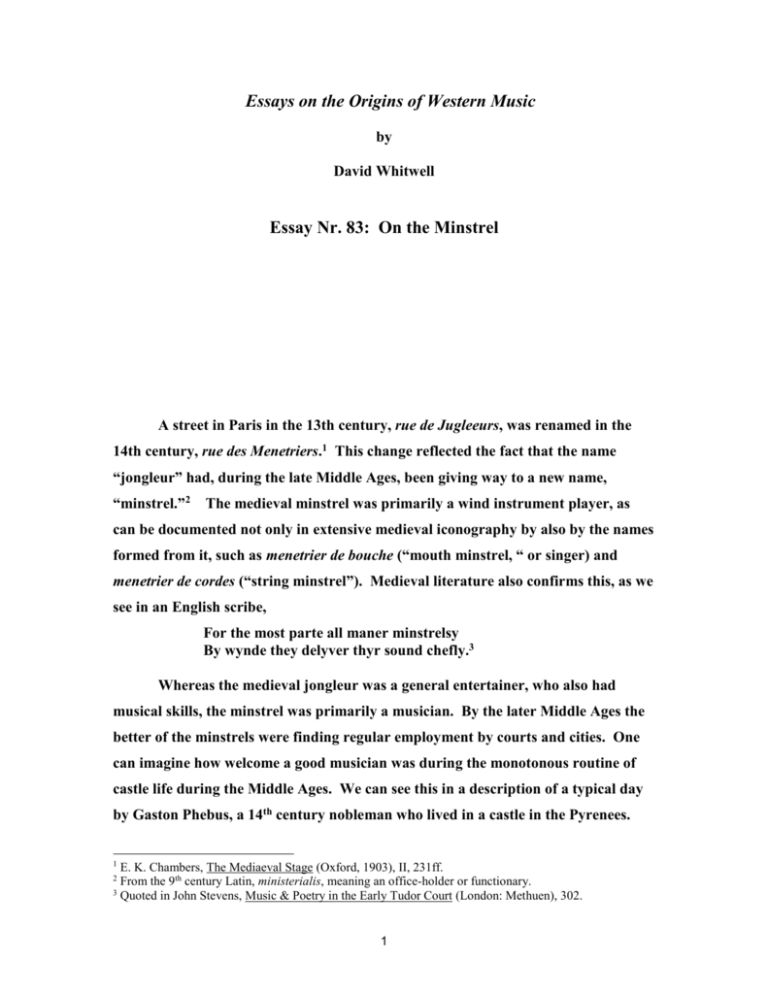
Essays on the Origins of Western Music by David Whitwell Essay Nr. 83: On the Minstrel A street in Paris in the 13th century, rue de Jugleeurs, was renamed in the 14th century, rue des Menetriers.1 This change reflected the fact that the name “jongleur” had, during the late Middle Ages, been giving way to a new name, “minstrel.”2 The medieval minstrel was primarily a wind instrument player, as can be documented not only in extensive medieval iconography by also by the names formed from it, such as menetrier de bouche (“mouth minstrel, “ or singer) and menetrier de cordes (“string minstrel”). Medieval literature also confirms this, as we see in an English scribe, For the most parte all maner minstrelsy By wynde they delyver thyr sound chefly.3 Whereas the medieval jongleur was a general entertainer, who also had musical skills, the minstrel was primarily a musician. By the later Middle Ages the better of the minstrels were finding regular employment by courts and cities. One can imagine how welcome a good musician was during the monotonous routine of castle life during the Middle Ages. We can see this in a description of a typical day by Gaston Phebus, a 14th century nobleman who lived in a castle in the Pyrenees. 1 E. K. Chambers, The Mediaeval Stage (Oxford, 1903), II, 231ff. From the 9th century Latin, ministerialis, meaning an office-holder or functionary. 3 Quoted in John Stevens, Music & Poetry in the Early Tudor Court (London: Methuen), 302. 2 1 Hunting; after the hunt, Mass; after Mass, the womenfold and the minstrels.4 And, of course, no one was happier than the minstrel, who could now give up his wandering life. One feels the heartfelt relief in this song by Walther von der Vogelweide, I’ve got my fief, everybody, I’ve got my fief! Now when it’s cold I don’t have to fear for my toes, I will beg a little less at stingy masters’ doors -I have fresh air in the summer, in winter my fire roars, and the noble king, the sweet king, is the one I have to thank. My neighbors find me a much more presentable man -they don’t look at me as though I were a scarecrow any more. I hated being poor, and I was poor too long -my mouth was so full of reproaches, my breath stank. Now the king has sweetened my breath -- and my song.5 Beginning about the 12th century towns began to develop a sense of identity and this was followed by more numerous civic celebrations, all of which required music.6 As minstrels began to be hired by towns they also began to wear distinguishing “uniforms,” short coats or capes with hoods decorated by the city’s coat of arms. With the arrival of the Renaissance consort principle, towns, churches and nobles began to purchase cases, or “families” of instruments for their minstrels to use. The most interesting part of the minstrel story was the “minstrel schools,” scolae ministrallorum, which began in the 12th century. These schools were held regularly during the week before Laetare Sunday in Lent, when minstrel performances were not allowed by the Church, and on a more informal basis whenever large numbers of minstrels gathered in the same town for a large fair, noble wedding or Church council. The numbers are surprising. An Italian town hosted 1,500 minstrels for one of these “schools” in 1324.7 And in England, in 1290, 426 minstrels arrived to celebrate the marriage of Margaret of England and John of 4 Quoted in Romain Goldron, Minstrels and Masters (H. S. Stuttman Co.), 25. “Dankspruch,” in Frederick Goldin, trans., German and Italian Lyrics of the Middle Ages (Garden City: Anchor Books, 1973), 109. 6 One of these, the civic bonfire, had it roots in ancient “bones fires” when a more complete specimen was the guest of honor. 7 Goldron, Op. cit., 38. 5 2 Brabant.8 As part of the knighthood ceremonies for the Prince of Wales in 1306, in London, a roll of payments lists nearly 200 minstrels by name.9 The main purpose of these “schools” was to trade and learn the latest repertoire from different countries,10 but also to buy and trade instruments. Other than a number of references of various nobles sending their minstrels to these schools, and documentation of the various towns which hosted them, there is no literature which describes them -- these were players, not writers. It is with this perspective, then, that our attention is drawn to a passage in Book III of Chaucer’s House of Fame.11 We believe this passage, which has been overlooked by musicologists, is a rare description by someone who had actually observed one of these minstrel schools. While this poem takes the form of a dream, it is our contention that he could only have imagined such a description of a large gathering of wind instrument minstrels if he had at some point witnessed one of these “schools.” The extraordinarily large number of instrumentalists in particular first attracts our attention for this reflects the large gatherings such as we have quoted above. Of the wind instrument players, Chaucer says he saw “many thousand times twelve!” There were others, playing instruments whose names he did not know, and they were more numerous “than there be stars in heaven.” These he says he won’t bother to name because it would take too much time and “time lost can in no way be recovered.” He concludes his description of players with the lowly jongleurs, some of whom were also famous and whose name he knew. But, again, to list them all, he says, “would take from now until doomsday!” The contention that this description was inspired by his having observed a minstrel school is strengthened by his reference to the presence of famous players, as well as foreign visitors (“Pipers of the Duche tonge”) and his specific mention that they all came “to lerne.” It may be our only eye-witness description of one of these schools. 8 Chambers, Op. cit., I, 44, fn. 4. Ibid., I, Appendix C. 10 The minstrels of Lille went to a school in Beauvais in 1436 “pour apprendre des nouvelles chansons.” Walter Salmen, Der Fahrende Musiker im Europaischen Mittelalter (Kassel, 1960), 181. 11 House of Fame, 1197ff. 9 3 Ful the castel alle aboute, Of alle maner of mynstralles And gestiours that tellen tales ..... Tho saugh I stonden hem behynde, Afer fro hem, al be hemselve, Many thousand tymes twelve, That maden lowde mynstralcyes In cornemuse and shalemyes, And many other maner pipe, That craftely begunne to pipe Bothe in doucet and in rede, That ben at festes with the brede, And many flowte and liltyng-horne, And pipes made of grfene corne ..... Ther saugh I famous, olde and yonge, Pipers of the Duche tonge, To lerne love-daunces, sprynges, Reyes, and these strange thynges. ..... There saugh I sitte in other se‘s, Pleyinge upon sondry gle‘s, Whiche that I kan not nevene, Moo than sterres ben in hevene, Of whiche I nyl as now not ryme, For ese of yow, and los of tyme. For tyme ylost, this knowen ye, Be no way may recovered be. There saugh I pleye jugelours, ..... What shuld I make lenger tale Of alle the pepil y ther say, Fro hennes into domes day! Concurrent with the time minstrels were beginning to be employed on a relatively permanent basis by towns and nobles, there was also a growing awareness that some minstrels were better than others, as players and as persons. Therefore there was a gradual desire to create categories of definition under the general name “minstrel.” In 1273 Alphonso X of Castile defined three levels of minstrel, which were basically composers, instrumentalists and reciters of “delightful” stories and a lowest category of bufos, common entertainers. 4 The better minstrels themselves no doubt also wished to separate themselves from their unemployed, wandering colleagues. By the 14th century those employed by cities and nobles began to call themselves “minstrel of honor.” This led to the impetus for attempting to legislate the rights of these minstrels, as we see in an English royal proclamation of 1316. Edward by the grace of God…to Sheriffes…greeting. Forasmuch as many idle persons, under colour of Minstrelsie, and going in messages [private homes] and other feigned business, have been and yet be received in other men’s houses to meat and drink and be not therewith contented if they be not largely considered with gifts of the lords of the houses…. We willing to restrain such outrageous enterprises and idleness, have ordained that to the houses of prelates, earls, and barons, none resort to meat and drink, unless he be a minstrel; and of these minstrels that there come none, except it be three or four minstrels of honour….12 Even though given better titles, minstrels employed by cities were still not considered as “citizens” and lacked, among other things, legal protection. This situation led eventually to attempts by the minstrels to form civic guilds, the first of which was the Nicolai-Bruderschaft of Vienna, established in 1288. The first minstrel guild of Paris, the Confrerie de St. Julien des menestriers, was founded in 1321 by 37 minstrels, of whom 8 were women. Meanwhile, the true wandering musician still existed appearing wherever extra musicians were needed to help a celebration. But beginning with the 14th century accounts of these musicians become more and more unflattering. In the Tales of Franco Sacchetti (1335 – 1400) we read of the sad desperation a minstrel who fastened a cymbal to the saddle of his horse. By putting a thistle under the horse’s tail, he caused the horse to continuously jump, causing the cymbal to sound for the purpose of attracting the public.13 An early 14th century poem by Lovato de’ Lovati describes cantastorie, wandering singers of romances. I was going by chance through the town of the springs Which takes its name from its three streets [Treviso], 12 Quoted in Edmonstoune Duncan, The Story of Minstrelsy (Detroit, 1968), 78. Mary Steegmann, trans., Tales from Sacchetti (Westport: Hyperion Press, 1978)ccxxv, 292. On the other hand, Sacchetti mentions a minstrel named Dolcibene who was knighted by Charles IV when he visited Rome. 13 5 Passing the time by strolling along, When I see on a platform in the piazza A singer declaiming the story of Charlemagne And the gestes of the French. The rabble hang round, Listening intently, charmed by their Orpheus. In silence I hear it. With a crude pronunciation He deforms the song written in French, Mixing it all up at his whim, without heed To art or the story. Still, the mob liked it....14 The 14th century English poet, William Langland, in his “Piers Plowman,” gives some detailed portraits of the minstrel during the beginning of the decline of this practice. First, he finds some he does not condemn and then describes the true wandering musician. And some make mirth as minstrels can And get gold for their music, guiltless, I think. But jokers [jongleurs] and word jugglers, Judas’ children, Invent fantasies to tell about and make fools of themselves, And have whatever wits they need to work if they wanted. What Paul preaches of them I don’t dare repeat here: Qui loguitur turpiloquium15 is Lucifer’s henchman. Beadsmen and beggars bustled about Till both their bellies and their bags were crammed to the brim; Staged fights for their food, fought over beer. In gluttony, God knows, they go to bed. And rise up with ribaldry, those robber boys. Sleep and sloth pursue them always.16 At this time we also begin to find references to the wander string player, who is almost always called a “beer fiddler.” This is the musician Langland refers to when he writes, And not fare like a fiddler or friar seeking feasts, At home in other men’s houses and hating his own.17 Langland provides a major sketch, almost an autobiography, of one of these less than admirable minstrels, a man named Hawkin. When we first meet him he calls himself “Active Life,” a reference to the practical versus Scholastic theoretical Quoted in John Larner, Culture and Society in Italy, 1290-1420 (New York: Scribner’s, 1971)., 176ff “Who speaks filthy language.” 16 Willaim Langland, “Piers Plowman,” trans., E. Talbot Donaldlson (New York: Norton, 1990), Prologue, 33fff. 17 Ibid., X, 95. 14 15 6 definitions of music which were being formulated by the universities. In spite of his siding with the practical musicians, when Hawkin first describes himself, he presents a picture of a musician who simply doesn’t have the skills to be successful. He hasn’t even acquired the hand-down garments which even the wandering musicians often received. “I am a minstrel,” said that man, “my name is Activa Vita. I hate everything idle, for from “active” is my name. A wafer-seller, if you want to know, and I work for many lords, But I’ve few robes as my fee from them, or fur-lined gowns. If I could lie to make men laugh, then I might look to get Either mantel or money among lords’ minstrels. But because I can neither play a tabor nor a trumpet nor tell any stories Nor fart nor fiddle at feasts, nor play the harp, Joke nor juggle nor gently pipe, Nor dance nor strum the psaltery, nor sing to the guitar, I have no good gifts from these great lords.18 To make up for his lack of musical skills, Hawkin appears to have earned his living by talk, primarily as an impostor of one kind or another. In fact, we next meet him in the habit of the clergy. I took close heed, by Christ, and Conscience did too, Of Hawkin the Active Man and how he was dressed. He had a coat of Christendom, as Holy Kirk believes, But it was soiled with many spots in sundry places, Here a spot of insolent speech, and there a spot of pride, Of scorning and of scoffing and unsuitable behavior; As in apparel and deportment proud among the people; Presenting himself as something more than he seems or is; Wishing all men would think him what he is not, And so he boasts and brags with many bold oaths; And impatient of reproof from any person living; And himself so singular as to seem to the people As if there were none such as himself, nor none so pope-holy; In the habit of a hermit, an order by himself, A religious sans rule or reasonable obedience; Belittling lettered men and unlettered both; Pretending to like lawful life and a liar in soul; With inwit and with outwit to imagine and study, As it would be best for his body, to be thought a bold man; And interfere everywhere where he has no business; 18 Ibid., XIII, 221ff. 7 Wishing every one to be assured his intellect was the best, Or that he was most clever at his craft, or a clerk of greatest wisdom, Or strongest on steed, or stiffest below the belt, And loveliest to look at and most lawful of deeds, And none so holy as he, nor any cleaner of life, Or fairest of features in form and in shape, And most splendid at song, or most skillful of hands, And glad to give generously, to get praise thereby, And if he gives to poor people, proclaims what he’s giving; Poor of possession in purse and in coffer; And like a lion to look at, and lordly of speech; Boldest of beggars; a boaster who has nothing, In town and in taverns telling his tales, And speaking of something he never saw and swearing it true.19 And, finally, his most “active life” was in pursuing the girls. For every maid that he met he made her a gesture Suggesting sin, and some he would savor About the mouth, or beneath begin to grope, Till their wills grow keen together and they get to work, As well on fasting days as Fridays and forbidden nights And as [well] in Lent as out of Lent, all times alike; Such works with them were never out of season.20 A character named, Conscience, tries to reform Hawkin, promising him success if he will follow the ethics of the Church. No herald nor harper will have a fairer garment Than Hawkin the Active Man, if you act according to my teaching, Nor any minstrel be held more worthy among poor and rich Than will Hawkin the waferer, who is Active Vita.21 Another character, Patience, now joins in and, taking bread from his bag, offers some to Hawkin in an impromptu Mass. “Have some, Hawkin,” said Patience, “and eat it when you’re hungry, Or when your teeth chatter for chill, or you chew your cheek for thirst. Shall never handcuffs harm you, nor anger of great lords, Prison or pain, for patientes vincunt.”22 19 Ibid., XIII, 271ff. Ibid., XIII, 344ff. 21 Ibid., XIV, 25ff. 22 Ibid., XIV, 51ff. Patientes vincunt, means “the patient overcome.” 20 8 By the fifteenth century more of the better musicians had been hired by towns and nobles, leaving the remaining true wandering musicians as a somewhat dishonorable class of entertainers. Francois Villon, in his “Great Testament,” mentions the musicians who waste their time playing in taverns. If you rhyme, jest, play cymbals or lute like a foolish and shameless impostor, or if you’re a mummer, magician or flutist, or if in the towns and the cities you do farces, plays or moralities, or if you’re a winner at dice, at cards or at ninepins, it soon is all gone (do you hear?) all to the girls and the taverns.23 Sometimes, no doubt, such behavior had ill results for these itinerant musicians, as we read in the text of a little ballade by Richard de Loqueville. When comrades sally forth to play In diverse countries here and there, They do not banquet every day On roasted capon or fat hare Save if with gold they are supplied. For just as sure it does betide That if a comrade lose his gains He ends with sorely wounded pride, His feet held fast by two stout chains.24 Christine de Pizan mentions one of these types, the goliards, remarking that the habits of “such dubious characters are a sure road to damnation.”25 On the other hand, in her The Book of the Duke of True Lovers, she describes the activities of minstrels in the entertainments surrounding a great court tournament performing roles not unlike the modern marching band.26 Six minstrels, with trumpets and drums, greet the arrival of the nobles and “blew so loudly that the hills and valleys resounded.” Francois Villon, “The Testament,” in William Williams, The Complete Works of Francois Villon (New York: David McKay, 1960)., lines 1700ff. 24 Translated by Gustave Reese, in Music in the Renaissance (New York: Norton, 1959)., 19. 25 Christine de Pizan, Mirror of Honor; the Treasury of the City of Ladies, trans., Charity Willard (Tenafly, NJ: Bard Hall Press, 1989), III, ix. 26 Christine de Pizan, The Book of the Duke of True Lovers, trans., Thelma Fenster (New York: Persea books, 1991), 60ff. 23 9 Menestrelz, trompes, naquaires y avoit plus de troys paires, qui si haultement cournoyent, que mons et vaulx resonnoyent.27 They performed for the banquet, “lending luster to the festival.” After the meal was finished they performed again “in gracious harmony.” During the course of the tournament itself, a piper played “spreading cheer about” and “minstrels trumpeted gaily.” The winners were greeted with music so loud “that God thundering might not have been heard.” Lors menestrelz liement cournoient, hairaux crioent, Lances brisent, cops resonnent, et ces menestrelz haut sonnent si qu’on n’oist Dieu tonnant. We have numerous extant accounts from 16th century England which provide an extensive view of the final chapter in the decline of the ancient wandering minstrel. London was one of few cities at this time in which there was sufficient work, beyond that taken by the civic wind bands and the aristocratic ensembles, for independent minstrels to see the hope for sustaining themselves. 28 Their opportunity to make a living rested in their success in obtaining the remaining available work in place of the true wandering minstrels. To accomplish this they formed a Minstrels Guild, modeled after the numerous civic music guilds throughout Europe. They received a charter in London in 1500, took as their patron saint St. Anthony and swore to guard against improper language. In their request for this charter they mentioned, The continual recourse of foreign minstrels, daily resorting to this City out of all the countries of Europe and enjoying more freedom than the freemen, causes the Minstrels of the City to be brought to such poverty and decay that they are not able to pay “lot and scot” and do their duty as other freemen do, since their living is taken from them by these foreigners.29 27 Christine de Pizan, Le livre du duc des vrais amants, in Oeuvres politiques (Paris, 1896), 79ff and 89ff. At the beginning of the 16th century 75% of the population was rural and only four cities in Western Europe had more than 100,000 inhabitants: Paris, Venice, Naples and Milan. 29 H. A. F. Crewdson, The Worshipful Company of Musicians (London: Knight), 28. 28 10 In particular, they accused the foreign, or wandering, musicians of outrageous behavior, appearing, uninvited, sometimes as many as five or six at a time crowding to the end of the tables, playing without skill and causing great pain and displeasure to the Citizens and to their honest friends and neighbors.30 By the time Henry VIII began his reign, the Minstrel Guild had become more organized, limiting the appearances of apprentices and establishing proficiency examinations. By mid-century, however, the pressure of competition sent the Guild back to court in an attempt to gain new restrictions against the wandering minstrels. The City Corporation complied, noting that competition was causing “hinderaunce of the gaines and profitts of the poore minstrels being freemen of the Cytie.” The wandering minstrel was now forbidden to sing or play in public halls, taverns, etc., or to take apprentices and neither minstrels, freemen nor “foreign musicion” could teach dancing.31 By mid-century other towns in England were passing local ordinances in an attempt to control the wandering minstrels. A civic code in Beverly, passed in 1555, forbids any part-time musician to play outside his parish.32 In York an ordinance of 1561 specifies that “no manner of foreigner” be allowed to practice any form of minstrelsy, singing or playing upon any instrument within any parish within this city or franchise thereof upon any church holidays or dedication days hallowed or kept within the same parish, or any brotherhood’s or freeman’s dinner or dinners.33 All these ordinances reflect an increasingly modern urban society concerned over beggars, peddlers, vagabond and rouges. A national law had been passed in 1547 which defined a vagabond as any able-bodied person without an income sufficient to support him who was found, 30 Ibid. Ibid., 36ff. 32 Edmondstoune Duncan, The Story of Minstrelsy (London, 1907), 217. 33 Walter Woodfill, Musicians in English Society from Elizabeth to Charles I (Princeton, 1953),, 111ff. Another ordinance in York requires the freemen musicians to instruct their apprentices in the art of conversation, in addition to just music, so that “he may be well thought of....” 31 11 either like a serving man wanting a master or like a beggar, [wandering and] not applying himself to some honest and legal art, science, service or labor...for three days or more.34 A justice of the peace was empowered to decide, in the case of an independent minstrel, for example, if he were following an “allowed art,” or was a vagabond. The penalties were rather serious: branding with a “V,” enslaving for two years, whipping until bloody, or the loss of ears, to name a few! An ordinance of 1572 goes further, for now a person traveling without a patron or proper traveling papers could be “grievously whipped, and burnt through the gristle of the right ear with a hot iron of the compass of an inch about” on first conviction and death on the third conviction!35 At about this time the religious right, the early Puritans, also began to attack the wandering minstrels. Stephen Gosson, in his “An Apologie of the Schoole of Abuse” attacks the wandering minstrels. London is so full of unprofitable Pipers and Fidlers, that a man can no sooner enter a tavern, but two or three of them land at his heals, to give him a dance before he departs; therefore let men of gravity examine the case, and judge uprightly, whether the sufferance of such idle beggars be not a grievous abuse in a commonwealth.36 One of the books inspired by Gosson’s attack on the arts was the Anatomy of the Abuses in England (1583) by Philip Stubbs. In this work, a dialogue between the speakers, Spudeus and Philoponus, Stubbs presents an unusually strong attack on the minstrel class, warning them to repent and stop playing, or go to Hell. Spudeus. What say you, then, of musicians and minstrels, who live only upon music? Philoponus. I think that all good minstrels, sober and chaste musicians (speaking of such drunken sockets and bawdy parasites as range the country, rhyming and singing unclean, corrupt, and filthy songs in taverns, ale-houses, inns and other public assemblies) may dance the wild Morris through a needle's eye. For how should they have chaste minds, seeing that their exercise is the pathway to all uncleanliness. There is no ship so balanced with massive matter, as their heads are fraught with all kinds of 34 Ibid., 56. Ibid., 57. 36 Stephen Gosson, “An Apologie of the Schoole of Abuse,” in The Schoole of Abuse, ed., Edward Arber (London, 1868), 70. 35 12 bawdy songs, filthy ballads and scurvy rhymes, serving for every purpose, and for every company. ….. But some of them will reply, and say, what, Sir! we have licenses from Justices of the Peace to pipe and use our minstrelsy to our best commodity. Cursed be those licenses which license any man to get his living with the destruction of many thousands! But have you a license from the Arch-justice of Peace, Christ Jesus? If you have so, you may be glad; if you have not (for the Word of God is against your ungodly exercises, and condemeth them to Hell), then may you as rogues, extrauagantes, and stragglers from the Heavenly Country, be arrested of the high Justice of Peace, Christ Jesus, and be punished with eternal death, notwithstanding your pretended licenses of earthly men. Who shall stand between you and the Justice of God on the day of Judgment? Who shall excuse you for drawing so many thousands to Hell? shall the Justices of Peace? shall their licenses? Oh, no: For neither ought they to grant any licenses to any to do hurt withal; neither (if they would) ought any to take them. Give over, therefore, your occupations, you pipers, you fiddlers, you minstrels, and you musicians, you drummers, you Tabretters, you flutists, and all other of that wicked brood; for the blood of all enticing allurements, shall be poured upon your heads at the day of judgment....37 In the 16th century English poetry of John Skelton (1460 – 1529) we have a contemporary glimpse of the true wandering minstrel, who was become a rather rare sight in England. His descriptions reveal that Skelton himself was sophisticated in his knowledge of music. First, of particular interest is the suggestion that the minstrel’s melodic improvisation is busy, but makes no sense. He solfas too haute, his treble is too high; He braggeth of his birth, that born was full base; His music without measure, too sharp in his Mi; He trimmeth in his tenor to counter pardee; His descant is busy, it is without mean; Too fat is his fancy, his wit is too lean. One minstrel he describes wishes he could read music, For on the book I cannot sing a note. Would to God, it would please you some day A ballad book before me for to lay, 37 Philip Stubbs, The Anatomy of the Abuses in England (1583), ed., Frederick Furnivall (London: The New Shakespeare Society, n.d.), 171ff. In another place Stubbs says beggars, if they cannot work, should be hung! [Ibid., II, 42]. 13 And learn me to sing re me fa sol!38 And he mentions the string minstrel, the “beer fiddler,” And what blunderer is yonder that played fiddle diddle? He findeth false measures out of his fond fiddle.39 Finally, in a fitting close to this discussion, Skelton reports on his encounter with an older minstrel who had suffered from his years of travel. He bit the lip, he looked passing coy; His face was belimmed, as bees had him stung: It was no time with him to jape nor toy. Envy had wasted his liver and his lung, Hatred by the heart so had him wrung That he looked pale as ashes to my sight.40 John Skelton, “The Bouge of Court,” in The Complete Poems of John Skelton, ed. Philip Henderson (London: Dent, 1959), 45. 39 John Skelton, “The Garland of Laurel,” in Ibid., 371. 40 Ibid., 46. 38 14
